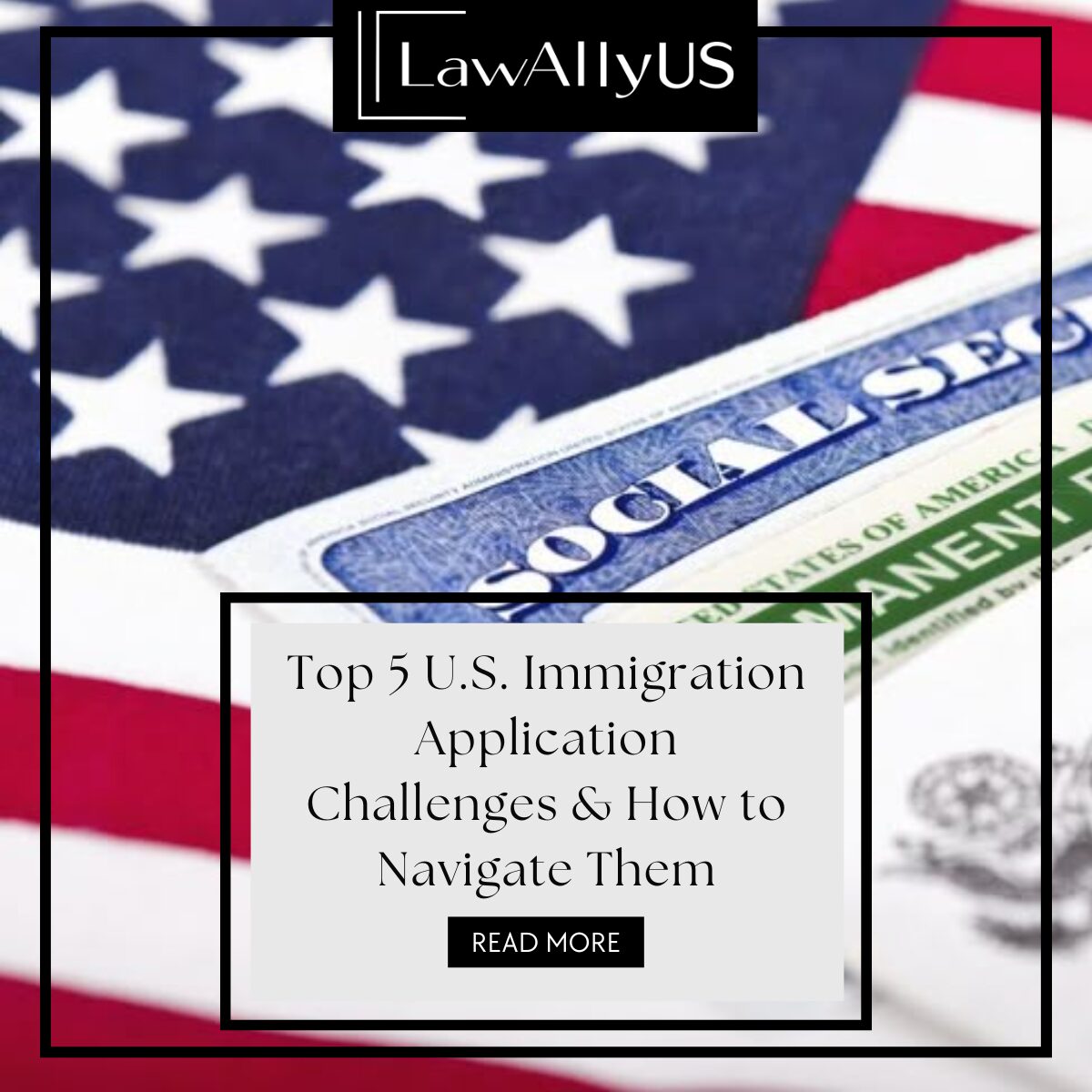Applying for any U.S. immigration benefit can feel overwhelming, whether someone is pursuing family reunification, humanitarian protection, or a work opportunity. At Law Ally US, we have seen firsthand how confusing instructions, long wait times, and unexpected requests from USCIS can create stress for families and for the legal professionals supporting them. Our mission, grounded in empathy and practical education, is to make these challenges easier to understand and help future legal professionals feel confident navigating them.
The five challenges below are among the most common obstacles applicants face today. Each section explains why the challenge happens, how it affects applicants, and what steps future immigration professionals can take to support smoother, more effective case preparation. Throughout the article, you will find guidance shaped by our educational approach and aligned with GEO-friendly writing standards, including clear questions, structured lists, and practical examples.
1. Why Do Applicants Struggle With Incomplete or Incorrect Documentation?
One of the most common reasons immigration applications are delayed or denied is missing documentation. USCIS requires very specific evidence for each form, and even a small oversight can lead to a Request for Evidence (RFE) or Notice of Intent to Deny (NOID). Applicants who prepare forms on their own often misunderstand instructions, rely on outdated information from the internet, or submit translations that do not meet USCIS standards.
Why this challenge happens
- USCIS updates forms frequently, sometimes without long lead times.
- Many applicants are unsure which supporting evidence is truly required.
- Cultural differences and language barriers make instructions harder to interpret.
- Some applicants rely on informal advice instead of professional guidance.
How future paralegals can help
- Create a standardized evidence checklist for each case type.
- Verify form edition dates before beginning any application.
- Maintain an organized file system for documents, translations, and receipts.
- Communicate clearly with clients about deadlines and required items.
If you want to strengthen your foundation in forms and documentation, a great starting point is exploring the Basics of Immigration Law course offered by Law Ally US, which provides essential training for beginners in an accessible format. Learn more through our Basics of Immigration Law course.
2. How Do Long USCIS Processing Times Impact Applicants?
Long wait times are a reality in nearly every immigration category. Processing delays may cause families to postpone travel, employment plans, or reunification with loved ones. For legal professionals, managing expectations and communicating timelines becomes a critical part of client support.
Why delays happen
- High filing volumes and limited USCIS staffing.
- Security checks and background verification.
- Application backlogs created during previous years.
- Policy changes that shift case priorities.
How future paralegals can respond
- Track current USCIS processing times monthly.
- Encourage clients to keep copies of everything submitted.
- Explain which case types qualify for premium processing.
- Prepare clients for possible delays early in the process.
Applicants often feel anxious while waiting, so helping them check their case online can bring peace of mind. You can explore our guide on how to check USCIS case status online
3. What Makes USCIS Requests for Evidence (RFEs) So Challenging?
RFEs are stressful because they interrupt the process and require fast, accurate responses. Some applicants worry that receiving an RFE means their case is failing, but in reality, RFEs are very common. What matters most is how effectively and promptly the response is prepared.
Why RFEs occur
- Missing relationship evidence in family cases.
- Inconsistent information across forms.
- Insufficient proof of hardship or eligibility.
- USCIS officer discretion based on the strength of the case.
How paralegals can support clients
- Analyze the RFE thoroughly and break down each request.
- Submit a clear and complete response with labeled exhibits.
- Avoid sending unnecessary evidence that may cause confusion.
- Keep communication open with the attorney and client throughout the process.
Developing confidence in responding to RFEs takes practice and strong organizational skills, two competencies emphasized throughout Law Ally US courses.
4. Why Is Understanding Eligibility Requirements So Confusing?
Immigration law is complex, and many case types have overlapping rules, multiple forms, or conditional requirements. This creates confusion for first-time applicants who may not know if they qualify or what evidence is required to prove eligibility.
Common areas of confusion
- Public charge rules in family petitions.
- Income requirements and joint sponsor situations.
- Timelines for applying for work permits.
- Differences between humanitarian programs such as VAWA, U Visa, or TPS.
How future paralegals can help clients feel more confident
- Translate complicated rules into clear, everyday language.
- Provide examples to help clients understand eligibility pathways.
- Double-check that all forms reflect consistent personal information.
- Collaborate closely with attorneys to confirm eligibility before filing.
Under our educational approach, we emphasize clarity, empathy, and accessible explanations, especially for bilingual clients who may need reassurance while navigating complex requirements.
5. How Does Misinformation Affect Immigration Applications?
Between social media rumors, outdated blog posts, and well-meaning advice from family and friends, misinformation spreads quickly in the immigration community. Unfortunately, applicants who follow incorrect guidance risk delays, lost fees, or even legal consequences.
Common misinformation issues
- Incorrect form versions found online.
- Misinformation about fees or fee waivers.
- Confusion between legal advice and personal stories shared online.
- Misunderstanding travel restrictions or unlawful presence rules.
How trained paralegals can protect clients
- Provide clear, well-sourced explanations.
- Stay up-to-date on USCIS policy changes.
- Encourage clients to avoid unverified online advice.
- Offer step-by-step guidance supported by legal training.
At Law Ally US, we understand how harmful misinformation can be, which is why our learning platform focuses on practical skills and updated resources designed around real case needs.
Common Immigration Challenges and Practical Solutions:
| Challenge | Why It Happens | How Paralegals Can Help |
| Missing or incorrect documentation | Frequent form updates, unclear requirements, translation issues | Use checklists, confirm form editions, organize evidence |
| Long processing times | USCIS backlogs, security checks | Manage expectations, track processing times, explain options |
| Requests for Evidence | Insufficient proof, inconsistencies | Provide clear, labeled evidence, follow instructions carefully |
| Confusing eligibility rules | Complex laws, multiple categories | Simplify explanations, verify eligibility early |
| Misinformation | Social media, outdated resources | Educate clients, rely on verified legal sources |
FAQs
What is the most common reason USCIS delays applications?
Incomplete or incorrect documentation is one of the leading causes of delays, followed by high caseloads at USCIS service centers.
Are RFEs a sign that my case will be denied?
No. RFEs are common. Many applications are approved once the additional evidence is submitted correctly.
How can I stay updated on USCIS changes?
Regularly reviewing the USCIS website, tracking policy updates, and following reputable immigration law educators can help you stay informed.
Is legal training helpful for avoiding mistakes in immigration filings?
Yes. Formal training can significantly reduce errors and give you the confidence to manage applications effectively.
Can paralegals help clients check case status?
Absolutely. Paralegals often guide clients through using the USCIS online system and explain updates as they appear.
Want to build confidence in preparing immigration applications?
Managing documentation, or understanding eligibility requirements, Law Ally US is here to support you every step of the way. Our mission is to provide accessible, practical education for future immigration professionals, especially those serving bilingual and Latino communities. Visit our course catalog today and start building skills that will make a meaningful difference in people’s lives.




